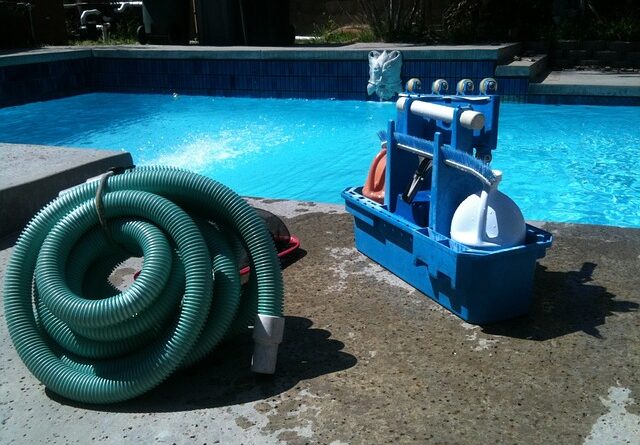Creative Tips for Effective Pool Maintenance
Table of Contents
Key Takeaways
- Regular maintenance prolongs the lifespan of your pool.
- Proper upkeep ensures a safe swimming environment.
- Simple techniques can make maintenance easy and cost-effective.
Maintaining a pristine pool might initially seem like a daunting task, but equipped with the right knowledge, it becomes an art of simplicity and satisfaction. Regular pool maintenance not only ensures a safe and inviting swimming environment but also significantly extends your pool’s lifespan, which can help alleviate the need for costly interventions such as pool repair St Louis MO. With a few creative and systematic approaches, you can ensure your pool remains a sparkling oasis for your leisure and entertainment.
Introduction: The Importance of Pool Maintenance
Pools are a luxurious escape, but they come with their own set of responsibilities. Regular maintenance is not merely about preserving the aesthetic appeal; it’s an essential measure for ensuring the safety and health of swimmers. Consistent cleaning and diligent chemical balancing prevent the onset of algae growth, bacterial contamination, and other issues that could lead to costly damages or repairs. A well-maintained pool is ultimately a stress-free addition to your home, providing a reliable retreat at any time you choose to dive in.
Essential Pool Equipment
Having the right equipment is as essential as your maintenance routine to maintain your pool efficiently. A pool skimmer is invaluable for daily leaves and debris removal, ensuring they don’t settle and cause complications. The pool vacuum is your ally for cleaning the pool floor, reaching beyond the surface aesthetics to tackle hidden grime. Complement these with a sturdy pool brush, perfect for scrubbing walls and steps, to keep your surfaces free from algae and dirt. Investing in quality equipment saves time and hassle in the long run, making maintenance smoother and more effective.
Weekly Pool Cleaning Routine
Establishing a consistent cleaning routine is key to maintaining a healthy pool. Start each day by skimming the surface, as removing debris promptly prevents it from sinking to the bottom, which can be harder to manage. Once a week, dedicate time to vacuuming the pool floor, ensuring thorough cleanliness, while a comprehensive brushing of the walls combats potential algae spots. Regularly inspecting and cleaning your pool filter is also crucial—think of it as your pool’s kidney, filtering out impurities and keeping the water clean and inviting.
Efficient Water Chemistry Management
Maintaining the balance of your pool’s water chemistry not only contributes to safety and cleanliness but also enhances swimmer comfort. Weekly testing of your water’s pH level is recommended, with the ideal range being 7.2 to 7.8. Keeping the pH within this range prevents skin irritation and equipment corrosion. Additionally, regularly checking alkalinity and calcium hardness helps protect the overall integrity of pool surfaces and equipment. Understanding and controlling water chemistry can appear complex, but with diligent practice, it becomes second nature.
Tackling Algae: Prevention and Solutions
Algae are the silent invaders of neglected pools, often beginning as unnoticed green patches before spreading quickly. Preventative measures include regular brushing and maintaining ideal chlorine levels, which create unfavorable environments for algae growth. If algae do appear, addressing them swiftly with shock treatments can effectively clear the water. The Pool & Hot Tub Alliance offers detailed insights on maintaining pool hygiene and effectively tackling algae-related issues, ensuring your pool remains a healthy haven.
Seasonal Maintenance Tips
The changing of seasons brings distinct pool maintenance requirements. In spring, focus on inspecting pool structures for winter damage and preparing filtration systems for increased activity. Over summer, when pool usage is high, maintain vigilant water chemistry checks and regular cleaning routines. As fall approaches, the influx of foliage requires increased skimming and filtration vigilance. Winterizing your pool before temperatures drop involves lowering the water level, draining equipment, and securing covers to protect against harsh conditions, keeping your pool ready for another cycle.
Eco-Friendly Pool Care Practices
Caring for your pool does not have to come at the expense of the environment. Eco-friendly practices like using solar covers can significantly reduce water evaporation and help maintain water temperature, reducing heating costs and energy consumption. Limiting chemical use and enhancing water circulation efficiency allows your pool to stay clean using fewer resources. The EPA provides excellent guidance on water conservation efforts, which can easily be integrated into pool care for a sustainable maintenance approach.
Common Pool Maintenance Mistakes
Avoiding common pitfalls in pool maintenance can prevent unnecessary frustration and expense. Neglecting the regular cleaning of filters, for example, decreases their efficiency and risks pool water quality. Misbalancing chemicals can lead to unhealthy swimming environments and potential equipment damage. Being informed and learning best practices are key preventive measures. With the right approach and attention to detail, maintaining a pool can be a seamless and rewarding experience, ensuring your oasis remains a source of enjoyment and relaxation.


